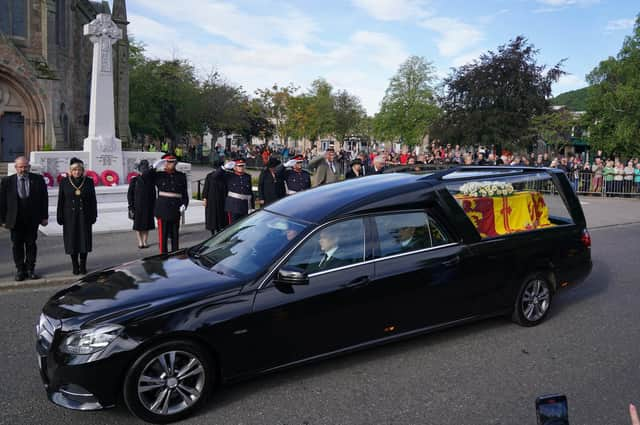Queen Elizabeth II: In mourning for our remarkable monarch, the four nations of the UK have been united. We should remember that – Christine Jardine MP


Today the country will draw the curtain on its relationship with its longest reigning monarch with the state funeral of Her late Majesty Queen Elizabeth II.
A week of ceremony that began with the emergence of her coffin from the privacy of her Balmoral estate will reach its finale in the full glare of the world’s media attention along the same streets where her coronation was celebrated 70 years ago.
Advertisement
Hide AdAdvertisement
Hide AdAlready commentators are feeding on every second of public and familial mourning to satisfy the appetite and impatience to understand what the new Carolean age might bring.
What will be our relationship with the new monarch? How will he approach a role he has been waiting for all his life?
We have already seen his stoicism, his steadfastness in the juxtaposition of his duty in the greeting of mourners and dignitaries who expect a meeting to remember, with the responsibility of the solemnity of ceremony and history.
We have witnessed his personality come through more than once in the ceremonial events and recognised an inherited ability to connect with public crowds.
Yet it is what this past week has told us about our attitude to the Union which may be most significant as we look forward to a different age.
It has been far too easy in the past to define the debate as a political argument about currency, foreign influence, and trading power. A decision based purely on abstract theories of economic and political power.
What we saw illustrated this past week was the overwhelming importance of personal, familial, and historical ties.
As someone whose life is divided into time spent between both of my capital cities, Edinburgh and London, my experiences in recent days underlined both the differences and the commonality.
Advertisement
Hide AdAdvertisement
Hide AdIn both, and indeed all along the route the Royal cortege took, the public wanted to be there, to show their respect. To take part in history, not to simply let it happen to them.
In Edinburgh, it was not just tens of thousands of Scots who lined the route to St Giles but very many of our compatriots from the North of England, who took the opportunity that a location much closer both geographically and, arguably emotionally, offered for them to express their grief.
In London, there were many Scots whose careers or personal lives have taken them south who came to Westminster for the lying-in-state.
Much of that must, of course, be attributed to the intense and personal connection so many people felt with Queen Elizabeth herself.
So often members of the public talked about her personality, her charm, her genuine interest in everyone she met.
But there was also a clear, strong recognition of and respect for the constitutional relationship.
We mourned together at official, organised and impromptu markings of respect and at events as wide ranging as religious ceremonies in parliament and before football matches.
The development of ceremonial mourning from those private moments at Balmoral to the state pomp of Westminster reflected and reinforced the ties that bind the Union. Not by dogma or diktat but by individuals’ consent.
Advertisement
Hide AdAdvertisement
Hide AdWe saw a dignified welcome to Edinburgh for both the late and newly acclaimed monarch by Lord Provost Robert Aldridge.
The condolences at the Scottish Parliament recognised the significance of the Crown of Scotland and our constitutional ties with the rest of the United Kingdom.
The comments by party leaders, with one unfortunate exception, were respectful tributes on behalf of their constituents to the constitutional head of state.
It was perhaps at Westminster where the two relationships with the Union – crown and political – came together most clearly.
It was there that the Accession Council confirmed His Majesty with not just Scottish representation from both parliaments, but public signature of the necessary documentation.
Scots MPs from all parties took part in the historic address to both Houses which affirmed Parliament's loyalty to the new monarch.
We heard King Charles III commit his service to the country and its people. And as the Royal Family relinquished their mother to the state for the final acts of mourning of the monarch, each of the constituent parts of the United Kingdom were represented.
Over the next few months and years, we shall no doubt pore over all these details again when the sensitivities of grief have largely passed and we have regard only to the political and power dynamics.
Advertisement
Hide AdAdvertisement
Hide AdBut I hope that we do not lose, or deliberately discard, the fellow feeling and community we have shared. Those of us in the privileged position of being an elected member are responsible to listen to those we serve.
This week, I watched as people came out of their homes and lined pavements in the same way as in Aboyne, Aberdeen, and beyond. Or as the people of Edinburgh, Belfast, Cardiff and London had done to welcome the new King.
What I saw was people respecting an unsurpassed individual contribution. Because she was an individual. One person who brought us together in good times and in bad.
As we watched people queue for hours, for miles, we saw friendships form and feelings shared. The essence of togetherness was right in front of us in the streets in all four nations.
I hope we remember how that felt.
Christine Jardine is the Scottish Liberal Democrat MP for Edinburgh West
Comments
Want to join the conversation? Please or to comment on this article.
